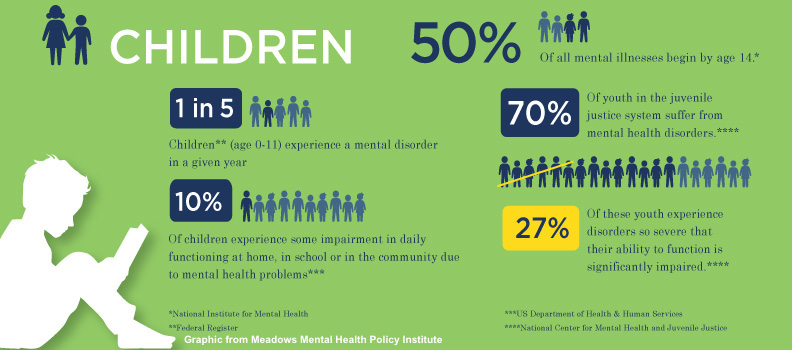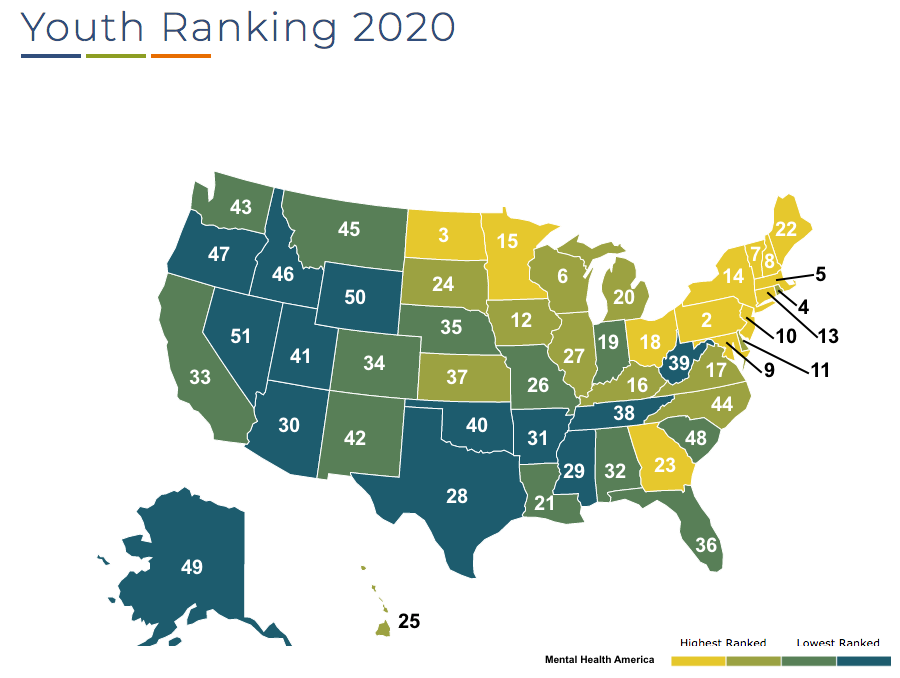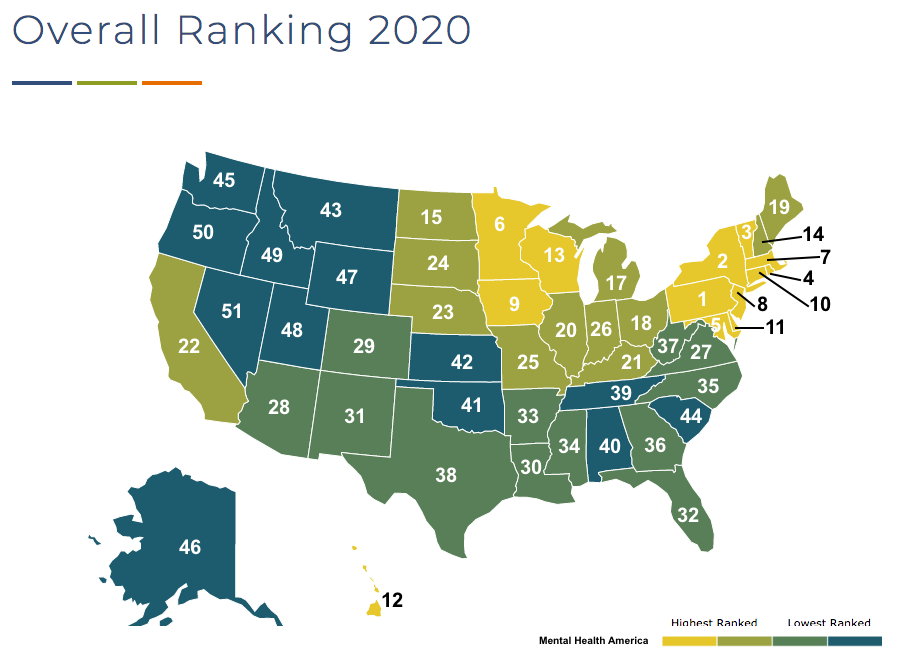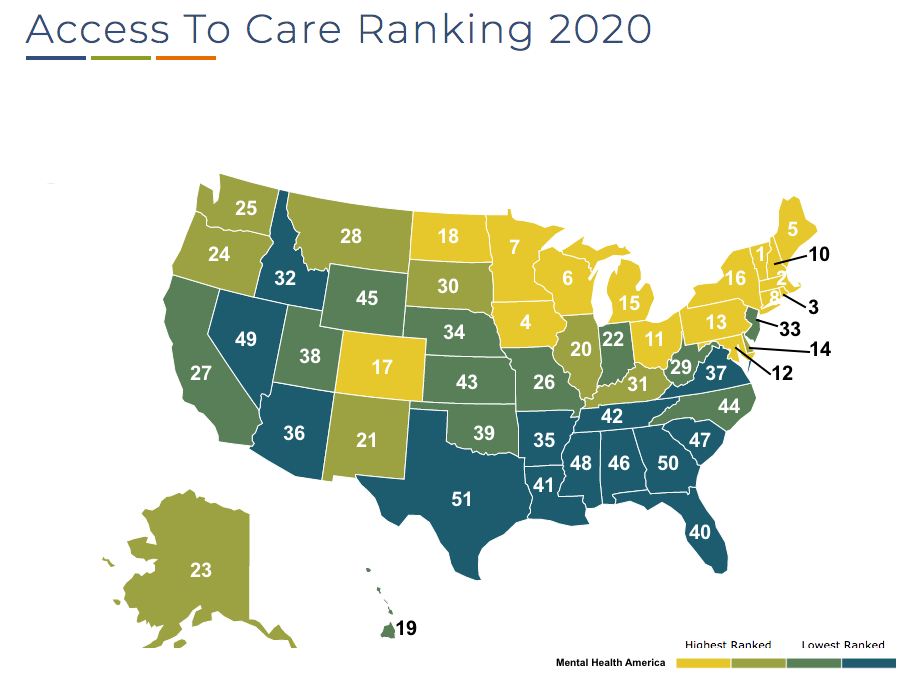January is Human Trafficking Prevention Month: Part 2 By: Justice Venture International [As we start the new…
Texas Ranks Last In Overall Access to Mental Health Care
The State of Mental Health in Texas
In recent years, the prevalence and access to mental health services have improved. Both nonprofit organizations and for profit companies have adapted their service delivery to address the challenges related to access. This is great news for Texas as the state has struggled to provide healthcare services consistently to all residents.
According to Mental Health America, Texas ranked third in mental illness prevalence, which indicates a lower prevalence of mental health and substance use issues. Again, this is great – fewer Texans (adults and youth) are suffering.
In 2019 The Rees-Jones Foundation partnered with the Meadows Mental Health Policy Institute to conduct an in-depth assessment of Dallas County’s mental health service and delivery systems for children, youth, and families.
According to the Meadows assessment, each year, nearly two in five school-age children and youth (about 180,000 in Dallas County) experience a mental health need requiring clinical intervention. Further, the most severe mental health conditions – those that increase risk of placement outside of the home or school – affect about 2,000 young people in the Dallas community each year.

According to Mental Health America, Texas ranked 51 – dead last – for access to care. The measures to determine this ranking considered access to insurance and treatment, quality and cost of insurance, access to special education, and workforce availability.
What this statistic is telling us is that for those Texans who are struggling with mental illness, help is harder to access.
The Meadows Mental Health Policy Institute’s assessment echoes this. It states that half of all mental health conditions manifest by age 14, and the average length of time between the initial onset of symptoms and access to needed care ranges from eight to 10 years.
Why is this? The principal findings from the Meadows assessment point to a number of reasons why Texas is lagging in access to mental health services:
- Primary care providers are not consistently screening for mental health concerns such as anxiety, depression and trauma.
- The system is at capacity, which makes it difficult for families to obtain timely care for their children when a mental health concern is identified.
- The system is at capacity due to staffing challenges, such as high-turnover, costs associated with training providers in evidence-based practices, and recruiting and retaining staff that are culturally competent for the population that the program services (i.e. language fluency).
- Children and youth with the highest needs lack access to the right services. Meadows estimated that just over 300 children and youth received Medicaid-funded intensive family services in the last year (i.e. intensive case management, rehabilitative services) – that represented about 14 percent of the 2,000 children and youth in Dallas County in need of such care.
According to Mental Health America, Texas ranked 28 in a combined measure of youth prevalence of mental illness and access to care, indicating moderate prevalence of mental illness and moderate access to care. MHA used seven measures to determine this ranking, including youth with at least one major depressive episode (MDE) in the past year, youth with severe MDE, youth with MDE who did not receive mental health services, and students identified with emotional disturbance for an Individualized Education Program.

According to Mental Health America, Texas ranked 28 in a combined measure of youth prevalence of mental illness and access to care, indicating moderate prevalence of mental illness and moderate access to care.
For comparison, Texas ranked 30 for adult prevalence of mental illness and access to care.
For all ages Texas ranks 38 out of 51 in regard to overall mental illness prevalence and access to care, according to Mental Health America, which indicates that Texas has higher prevalence of mental illness and lower rates of access to care. The ranking was determined through the consideration of 15 measures including adults and youth with any mental illness, substance abuse disorder or serious thoughts of suicide, and mental health workforce availability.

Texas ranks 38 out of 51 in regard to overall mental illness prevalence and access to care, according to Mental Health America, which indicates that Texas has higher prevalence of mental illness and lower rates of access to care.
This drop in ranking when considering the big picture – prevalence of mental illness and access to care – underscores the importance of access to care. Although Texas has a very low prevalence of mental illness, one could conclude that our lack of access to care is what caused our overall score (38) to be lower when compared to our youth (28) and adult (30) rankings.
Another statistic that isn’t largely talked about is the suicide rate in Texas. According to the American Foundation for Suicide Prevention, Suicide is the 11th leading cause of death in Texas, the 4th leading cause for Texans age 35-44 and 2nd leading cause for Texans ages 15-34.
Although these statistics are grim, the future of mental health access for Texas is bright. There are scores of nonprofit organizations that are taking up the call to make access to mental health services easier and more readily available.
Alliance for Greater Works – African American Faith-Based Mental Health
About the Program
Alliance is a member of the African American Faith-Based Mental Health Education Initiative. The mission of the Initiative is to provide trauma-informed training for churches and increase awareness of mental health issues, recovery and wellness in the African American communities. They also host Mental Health First Aid training.
How It Works
According to the African American Faith-Based Mental Health Education Initiative, “one in four individuals will experience a mental health condition during his or her lifetime; however, studies show that only half of African American adults experiencing mental health conditions seek treatment. In times of emotional distress, evidence has shown African Americans draw support from their faith, family and communities.”
By training members of the church to respond to mental health concerns, the community can better serve those struggling. The Initiative’s goals are to build on the unique strengths of churches and other faith-based organizations in African American communities, identify and connect congregants with local behavioral resources for treatment and support, and support faith leaders in addressing their own mental wellness.
The Center for Integrated Counseling and Psychology – PACT Program
About the Program
The Center established the Partnerships for Accessible Counseling and Training program, known as PACT, to provide mental health counseling by removing the barriers to access such as language, geography, transportation, finances and social stigma.
The program teams up with established nonprofits whose clients would not have access to mental health care. By collaborating and co-locating with established nonprofits, counseling is provided onsite in communities, in a safe and comfortable environment, where people already receive services such as food, clothing and after school care.
How It Works – PACT Partners
Counselors from The Center are embedded at several nonprofits in Dallas. Individuals can receive mental health services through local nonprofits such as…
- Brother Bill’s Helping Hand – they provide medical care and other services such as food distribution, job skills training, exercise classes, and children’s programming in West Dallas. The Center provides counseling integrated within their clinic.
- Buckner Family Hope Center – they are child-centered, family-focused places where families go to find hope, support and empowerment. The Center provides counseling in their Family Pathways program which supports single parents as they obtain their education, and work through traumas such as human trafficking and domestic violence. The Center is also at the Wynnewood Family Hope Center where out-of-school programming and empowerment services are provided.
- Incarnation House – they partner with 20+ local organizations to provide a hub of wrap-around services focusing on educational, emotional, and vocational support for at-risk and housing insecure youth. The Center provides counseling integrated within their program schedule.
- The Salvation Army – they help North Texas combat addiction, homelessness, and poverty. In partnership with The Center, through Texas Health Resources’ Well Together Program, will be offering free mental health services in their Pleasant Grove Community Center.
The Family Place – Reprieve for Families Impacted by Domestic Violence
About the Program
The Family Place offers community-based counseling services for survivors of domestic violence and counseling for children that have witnessed violence. Their Partner Advocate program provides services to victims whose partners have been referred to The Family Place Battering Intervention & Prevention Program.
Over the past 41 years, The Family Place has counseled more than 216,500 clients.
How It Works
Counseling services are free and confidential. Their group counseling is designed to show survivors that they aren’t alone, and encourage them to find support from staff and peers.
Counseling for children at The Family Place utilizes play therapy and activity-based programming to help children who have witnessed family violence to change the way they look at the world in order to heal.
Through their Partner Advocate Program, The Family Place offers supportive survivor services to partners of BIPP program participants. The survivor’s Advocate provides case management and court accompaniment services to help survivors understand the dynamics of abuse, safety options and their rights.
Jewish Family Service of Greater Dallas – Counseling & Therapy Services for Children & Teens and Adults
About Jewish Family Service
Jewish Family Service of Greater Dallas is a nonsectarian mental health and social services agency that impacts over 13,000 lives a year. For 70 years, JFS has welcomed anyone regardless of race, ethnicity, religion, or the ability to pay.
About the Program
JFS staff is comprised of Licensed Clinical Social Workers, Licensed Marriage & Family Therapists, Licensed Professional Counselors, and Licensed Psychologists. Their counseling seeks to help children, teens and adults identify and understand their feelings, and develop skills and behaviors to better deal with them.
JFS is one of only six DFW agencies accredited by the Council on Accreditation, and services are offered to anyone who could benefit.
How It Works
JFS provides a wide range of counseling services specially tailored to children and adolescents, including individual counseling, mental health addiction counseling, adapted counseling for those with special needs, play therapy, and psychological evaluations.
Jewish Family Service provides clinical, therapeutic services for adults to address personal, emotional crises such as depression, anxiety, mood disorders, and/or serious personal difficulties including conflicts in interpersonal relationships such as marriage or peer friendships. Services include individual, family, and marriage or group counseling. Additionally, JFS offers care management, grief support groups, parent/child support, pre-marital workshops, and family violence intervention and counseling.
Lena Pope – Counseling for Children, Adults and Families
About the Program
Lena Pope provides counseling services to families in Fort Worth and the surrounding areas that are designed to meet the treatment needs of those suffering from mental health challenges and substance use. Counseling services are provided to children, adolescents and families for issues including anxiety, depression, trauma, and disruptive behavior.
Their goal is to ensure all members of the community have access to mental health and substance use treatment.
How It Works
Lena Pope is licensed by the State of Texas to provide substance use treatment. Through partnerships with cities, counties and state agencies, Lena Pope’s counseling services offer a variety of programs to keep families together and achieve their goals.
Counseling programs include intensive in-home support for families and youth involved in drug court, child and family assessments and counseling for Fort Worth ISD, and individual and group substance use treatment for adults.
Momentous Institute – Community Counseling Services
About the Program
The Momentous Institute believes that with strong social emotional health, every child can defy any odds and change the trajectory of their lives.
Families who seek therapeutic services at Momentous do so because of worries a child might be depressed or anxious, concerns about bullying, worries about the impact of a traumatic experience, uncertain about parenting, or in response to school concerns related to behavior or emotions.
How It Works
Therapeutic Services work side-by-side with families using a strengths-based approach to resolve conflict, process trauma and manage stress. They aim to identify and address concerns, establish long-term solutions and work alongside families to help strengthen their bonds and commitment.
Over 30 licensed therapists and trainees specialize in family therapy, play therapy, parent education and Huddle Up, a program aimed at empowering youth to improve self-regulation, problem solve and strengthen communications.
As a result, 80 percent of children in Momentous therapeutic services with an identified social, emotional and/or behavioral challenge significantly improved their functioning.
VitalSign6: Center for Depression Research and Clinical Care at UT Southwestern
About the Program
VitalSign6: Making Screening for Depression the Sixth Vital Sign is an easy-to-use, comprehensive program for the identification and treatment of depression in primary care, pediatric, and specialty clinics. The program utilizes an innovative web-based iPad application to administer the Patient Health Questionnaire and Measurement-Based Care systematic assessments to patients.
Their Mission
Depression remains a major health problem. One in six adults will experience depression in his or her lifetime with the first episode occurring in childhood or adolescence (Hales et al. 2014).
VitalSign6 aims to provide medical providers with the means to efficiently and effectively diagnose and manage depression and improve care for patients through:
- The implementation of routine, evidence-based depression screening,
- The integration into standard practice of a scientifically validated, measurement-based care program for the treatment of depression for patients who screen positive, and
- Integrated clinical decision support.
How It Works
VitalSign6 is embedded in adult, pediatric and oncology clinics across the Metroplex. View the UTSW Depression Center Mood Disorders Network here.
While Physical Assistants or nurses are taking vital signs at the beginning of a doctor appointment, a screening for depression will also be administered via the VitalSign6 web-based application. If a patient screens positive for depression, the physician can then create a treatment plan based on severity and other questionnaire results.
Share this post:
Category: Original Content
January is Human Trafficking Prevention Month: Part 1 By Shellie Velasco, Program Officer [As we start the…
Welcome to 2025 By Adrian Cook, Director of Research & Evaluation “But the steadfast love of the…


